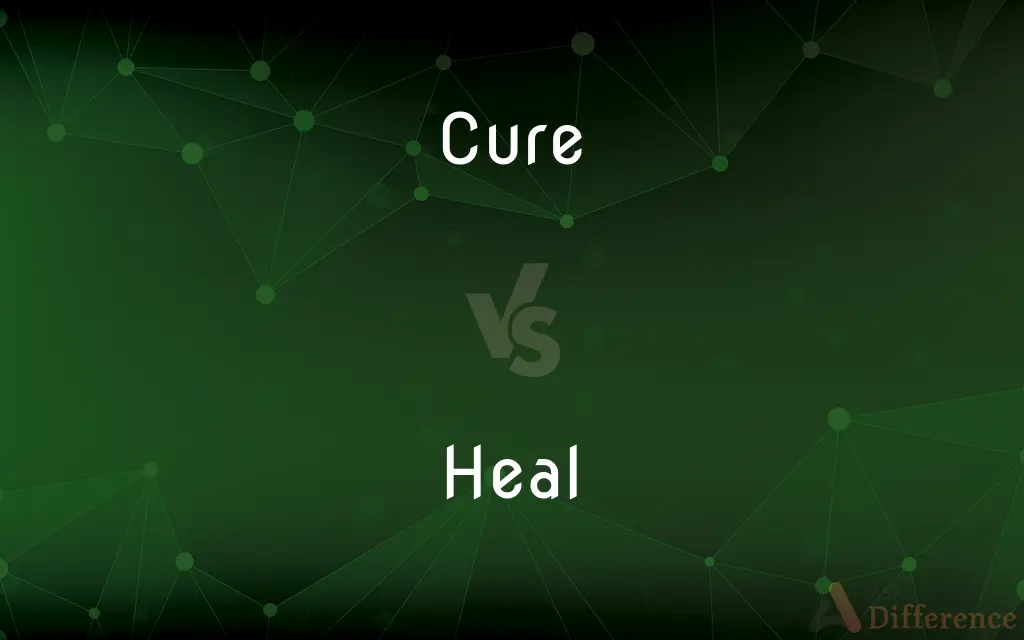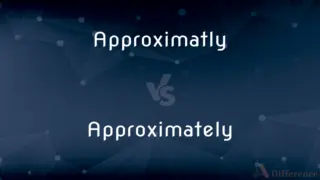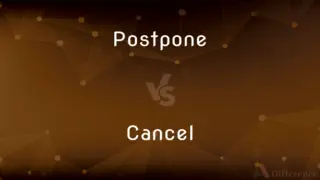Cure vs. Heal — What's the Difference?
By Tayyaba Rehman — Published on August 25, 2023
Cure refers to a complete eradication of a disease or condition; heal refers to the process of recovery or restoration.

Difference Between Cure and Heal
Table of Contents
ADVERTISEMENT
Key Differences
Cure and heal, though often used interchangeably, have nuanced differences. Cure is a term often related to medical treatments and refers to the complete elimination of a disease or condition. On the other hand, heal tends to be a broader term, indicating the process of becoming well or the restoration of health. It's not just the absence of an ailment, but the return to a state of wellness.
Cure suggests a more immediate and sometimes permanent resolution, often as a result of a specific treatment or intervention. It's when a doctor might say, "This medicine will cure your infection." Heal, conversely, suggests a more gradual process. It encompasses not just the physical, but also emotional, psychological, and even spiritual recovery. "After the surgery, it will take time for your body to heal," a physician might advise.
When one says they are seeking a cure, they are often looking for a tangible solution or treatment that can end their suffering or ailment. It's a definitive end to a specific problem. In contrast, to say one is looking to heal can imply a desire for overall betterment, rejuvenation, or coming to terms with an ailment or trauma.
In some contexts, cure is objective and measurable. Medical tests can prove the absence of a disease, confirming a cure. Heal is more subjective; it's not always something that can be measured or quantified, but rather felt by the individual. While one can be cured without being fully healed, the process of healing can often lead to a cure.
Comparison Chart
Definition
Complete eradication of a disease or condition
Process of recovery or restoration of health
ADVERTISEMENT
Duration
Often immediate or short-term
Typically gradual
Scope
Medical, specific
Broader: physical, emotional, psychological
Measurability
Objective and quantifiable
More subjective
Outcome
Disease-free state
Overall well-being and restoration
Compare with Definitions
Cure
A remedy to eliminate a disease.
Penicillin was a significant cure for bacterial infections.
Heal
To become sound or healthy again.
It took weeks for his broken arm to heal.
Cure
A solution or answer to a problem.
Finding alternative energy is a cure for our dependence on fossil fuels.
Heal
To alleviate a person's distress or anguish.
Time will heal the pain of loss.
Cure
The process of preserving meat, fish, or other foods.
She learned how to cure meats from her grandmother.
Heal
To mend or repair.
The community came together to heal the rift between neighbors.
Cure
The process of hardening materials, such as concrete or polymers.
The concrete will take 24 hours to cure completely.
Heal
To restore to health or soundness; cure
Healed the sick patient.
Cure
To set free from (something injurious or blameworthy), as from a bad habit.
I never knew any man cured of inattention.
Heal
To ease or relieve (emotional distress)
Only time can heal her grief.
Cure
To eliminate (a disease, for example) from the body by medical or other treatment; cause recovery from
New antibiotics to cure infections.
Heal
To restore damaged land or environment.
Efforts are underway to heal the deforested areas.
Cure
(obsolete) Care, heed, or attention.
Heal
To cover, as a roof, with tiles, slate, lead, or the like.
Cure
(intransitive) To solidify or gel.
The parts were curing in the autoclave.
Heal
To make whole or free from ailments.
Herbs have been used for centuries to heal various illnesses.
Cure
(obsolete) To pay heed; to care; to give attention.
Heal
To recover from an illness or injury; return to health.
Cure
A cure is a substance or procedure that ends a medical condition, such as a medication, a surgical operation, a change in lifestyle or even a philosophical mindset that helps end a person's sufferings; or the state of being healed, or cured. The medical condition could be a disease, mental illness, genetic disorder, or simply a condition a person considers socially undesirable, such as baldness or lack of breast tissue.
Heal
To reconcile, as a breach or difference; to make whole; to free from guilt; as, to heal dissensions.
Cure
Relieve (a person or animal) of the symptoms of a disease or condition
He was cured of the disease
Heal
Health.
Cure
Preserve (meat, fish, tobacco, or an animal skin) by salting, drying, or smoking
Home-cured ham
Heal
Heal or recover;
My broken leg is mending
Cure
A parish priest in a French-speaking country.
Heal
Get healthy again;
The wound is healing slowly
Cure
A drug or course of medical treatment used to restore health
Discovered a new cure for ulcers.
Heal
Provide a cure for, make healthy again;
The treatment cured the boy's acne
The quack pretended to heal patients but never managed to
Cure
Restoration of health; recovery from disease
The likelihood of cure.
Heal
To set right; repair
Healed the rift between us.
Cure
Something that corrects or relieves a harmful or disturbing situation
The cats proved to be a good cure for our mouse problem.
Heal
To experience relief from emotional distress
Gave the grieving family time to heal.
Cure
(Ecclesiastical) Spiritual charge or care, as of a priest for a congregation.
Heal
To be relieved or eliminated
The rift between them finally healed.
Cure
The office or duties of a curate.
Heal
(intransitive) To become better or healthy again.
Bandages allow cuts to heal.
Cure
The act or process of preserving a product.
Heal
To reconcile, as a breach or difference; to make whole; to free from guilt.
To heal dissensions
Cure
A parish priest, especially in a French-speaking community.
Heal
(rare) conceal.
Cure
To cause to be free of a disease or unhealthy condition
Medicine that cured the patient of gout.
Heal
A spell or ability that restores hit points or removes a status ailment.
Cure
To cause to be free of, to lose interest in, or to stop doing something
A remark that cured me of the illusion that I might be a good singer.
A bad reaction that cured him of the desire to smoke cigars.
A visit to the dentist that cured her of eating sweets.
Heal
Health
Cure
To remove or remedy (something harmful or disturbing)
Cure a social evil.
Heal
To make hale, sound, or whole; to cure of a disease, wound, or other derangement; to restore to soundness or health.
Speak the word only, and my servant shall be healed.
Cure
To preserve (meat, for example), as by salting, smoking, or aging.
Heal
To remove or subdue; to cause to pass away; to cure; - said of a disease or a wound.
I will heal their backsliding.
Cure
To vulcanize (rubber).
Heal
To restore to original purity or integrity.
Thus saith the Lord, I have healed these waters.
Cure
To effect a cure or recovery
A drug that cures without side effects.
Heal
To grow sound; to return to a sound state; as, the limb heals, or the wound heals; - sometimes with up or over; as, it will heal up, or over.
Those wounds heal ill that men do give themselves.
Cure
To be prepared, preserved, or finished by a chemical or physical process
Hams curing in the smokehouse.
Heal
(transitive) To make better from a disease, wound, etc.; to revive or cure.
This bandage will help to heal your cut.
Cure
A method, device or medication that restores good health.
Cure
Act of healing or state of being healed; restoration to health after a disease, or to soundness after injury.
Cure
A process of solidification or gelling.
Cure
(engineering) A process whereby a material is caused to form permanent molecular linkages by exposure to chemicals, heat, pressure and/or weathering.
Cure
Spiritual charge; care of soul; the office of a parish priest or of a curate.
Cure
That which is committed to the charge of a parish priest or of a curate.
Cure
(transitive) To restore to health.
Unaided nature cured him.
Cure
(transitive) To bring (a disease or its bad effects) to an end.
Unaided nature cured his ailments.
Cure
(transitive) To cause to be rid of (a defect).
Experience will cure him of his naïveté.
Cure
To preserve (food), typically by salting. is this sense distinct from the preceding one? another example might be useful
Cure
(intransitive) To bring about a cure of any kind.
Cure
(intransitive) To be undergoing a chemical or physical process for preservation or use.
The meat was put in the smokehouse to cure.
Cure
To become healed.
Cure
Care, heed, or attention.
Of study took he most cure and most heed.
Vicarages of greatcure, but small value.
Cure
Spiritual charge; care of soul; the office of a parish priest or of a curate; hence, that which is committed to the charge of a parish priest or of a curate; a curacy; as, to resign a cure; to obtain a cure.
The appropriator was the incumbent parson, and had the cure of the souls of the parishioners.
Cure
Medical or hygienic care; remedial treatment of disease; a method of medical treatment; as, to use the water cure.
Cure
Means of the removal of disease or evil; that which heals; a remedy; a restorative.
Cold, hunger, prisons, ills without a cure.
The proper cure of such prejudices.
Cure
A curate; a pardon.
Cure
To heal; to restore to health, soundness, or sanity; to make well; - said of a patient.
The child was cured from that very hour.
Cure
To subdue or remove by remedial means; to remedy; to remove; to heal; - said of a malady.
To cure this deadly grief.
Then he called his twelve disciples together, and gave them power . . . to cure diseases.
Cure
To prepare for preservation or permanent keeping; to preserve, as by drying, salting, etc.; as, to cure beef or fish; to cure hay.
Cure
To pay heed; to care; to give attention.
Cure
To restore health; to effect a cure.
Whose smile and frown, like to Achilles' spear,Is able with the change to kill and cure.
Cure
To become healed.
One desperate grief cures with another's languish.
Cure
Provide a cure for, make healthy again;
The treatment cured the boy's acne
The quack pretended to heal patients but never managed to
Cure
Prepare by drying, salting, or chemical processing in order to preserve;
Cure meats
Cure pickles
Cure
Make (substances) hard and improve their usability;
Cure resin
Cure
Be or become preserved;
The apricots cure in the sun
Cure
Restoration to health from a disease.
The patient was seeking a cure for his persistent cough.
Cure
To prepare, preserve, or finish (a substance) by a chemical or physical process.
Cure
(figurative) A solution to a problem.
Cure
A process of preservation, as by smoking.
Cure
(transitive) To prepare or alter especially by chemical or physical processing for keeping or use.
The smoke and heat cures the meat.
Cure
Act of healing or state of being healed; restoration to health from disease, or to soundness after injury.
Past hope! pastcure! past help.
I do cures to-day and to-morrow.
Cure
A medicine or therapy that cures disease or relieve pain
Common Curiosities
What's the primary difference between cure and heal?
Cure refers to a complete eradication of a disease or condition; heal refers to the process of recovery or restoration.
Are the terms cure and heal only associated with medical contexts?
No. While both are used in medical contexts, cure can also refer to solutions to problems or preserving foods, and heal can mean mending relationships or environments.
Can a medication cure and heal at the same time?
While a medication might cure a disease, the body and mind might still need time to heal or recover fully.
Is cure a more immediate term than heal?
Often, yes. Cure suggests a more immediate or permanent resolution, whereas heal suggests a more gradual process.
Is cure always a permanent state?
Not always. While some cures are permanent, others might need ongoing treatment to maintain.
Can one be cured but not healed?
Yes, one can be medically cured but still need time to emotionally or psychologically heal.
Is the process of healing always visible or measurable?
No, healing is often subjective and can encompass emotional or psychological recovery, which isn't always visible.
Do all diseases have a cure?
No, not all diseases have a known cure, but medical research continually seeks solutions.
Can emotional traumas be cured?
Emotional traumas might not be "cured" in the traditional sense but can be addressed, processed, and healed over time.
Is healing always a physical process?
No, healing can be physical, emotional, psychological, or even spiritual.
Share Your Discovery

Previous Comparison
Approximatly vs. Approximately
Next Comparison
Postpone vs. CancelAuthor Spotlight
Written by
Tayyaba RehmanTayyaba Rehman is a distinguished writer, currently serving as a primary contributor to askdifference.com. As a researcher in semantics and etymology, Tayyaba's passion for the complexity of languages and their distinctions has found a perfect home on the platform. Tayyaba delves into the intricacies of language, distinguishing between commonly confused words and phrases, thereby providing clarity for readers worldwide.













































